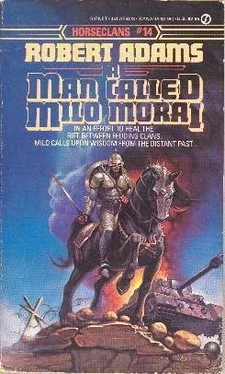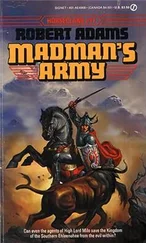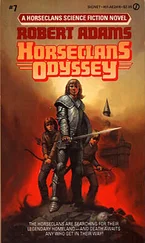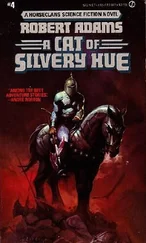Robert Adams - A Man Called Milo Morai
Здесь есть возможность читать онлайн «Robert Adams - A Man Called Milo Morai» весь текст электронной книги совершенно бесплатно (целиком полную версию без сокращений). В некоторых случаях можно слушать аудио, скачать через торрент в формате fb2 и присутствует краткое содержание. Жанр: Фантастика и фэнтези, на английском языке. Описание произведения, (предисловие) а так же отзывы посетителей доступны на портале библиотеки ЛибКат.
- Название:A Man Called Milo Morai
- Автор:
- Жанр:
- Год:неизвестен
- ISBN:нет данных
- Рейтинг книги:3 / 5. Голосов: 1
-
Избранное:Добавить в избранное
- Отзывы:
-
Ваша оценка:
- 60
- 1
- 2
- 3
- 4
- 5
A Man Called Milo Morai: краткое содержание, описание и аннотация
Предлагаем к чтению аннотацию, описание, краткое содержание или предисловие (зависит от того, что написал сам автор книги «A Man Called Milo Morai»). Если вы не нашли необходимую информацию о книге — напишите в комментариях, мы постараемся отыскать её.
A Man Called Milo Morai — читать онлайн бесплатно полную книгу (весь текст) целиком
Ниже представлен текст книги, разбитый по страницам. Система сохранения места последней прочитанной страницы, позволяет с удобством читать онлайн бесплатно книгу «A Man Called Milo Morai», без необходимости каждый раз заново искать на чём Вы остановились. Поставьте закладку, и сможете в любой момент перейти на страницу, на которой закончили чтение.
Интервал:
Закладка:
Osterreich, looking chubbier than Milo remembered him, holding his crystal wineglass delicately by its stem, shook his head sadly. “The former Major, now Lieutenant, Jarfis is a sad case, misplaced to .begin, then terribly overworked. He is not possessed of either emotional or of physical strength or endurance, unfortunately. He is seriously crippled by some rather sefere phobias and a most irrational belief he has in his intuitife powers.
“The unfortunate man is skirting perilously close to a nervous collapse at the best of times and I therefore made a recommendation that he be hospitalized or separated for the good of the Army. But he apparently possessed of some influential friends is and he only was reduced in rank, reprimanded and then sent on his way to continue, one supposes, to ferret out Nazi sympathizers and spies.
“And the saddest of all about him is that he most likely a real Nazi would not know. A real spy would easily hoodwink such a man as him, for he is far from truly intelligent and the most of his boasted intuition mainly is self-delusion.
“I know Nazis, gentlemen, I attended several meetings of the fledgling National Socialist German Workers’ Party in the nineteen hundred and twenties, and in those early days of the party I was honored and welcomed and made much of as a former cavalry officer of the Imperial Austrian Army. All of this was, of course, before the fact of my Jewishness became all-important to them. I impart to you all no secret, here. It all is well known to any who wish to learn of it, for it was not only the National Socialists’ meeting I attended now and then, but the Communists’, the Monarchists’, the Anarchists’ and many another group, all of whom I found to be basically the same—a cadre of wild-eyed but cunning fanatics attempting to form hordes of troubled, desperate, demoralized German men and women into a political power base.
“The man Jarfis knows nothing about the Nazis, although had he been a German in Germany, he would no doubt have made them a good recruit, though he is too unstable to have been able to rise very far in their ranks. His ideas of Nazism are terribly skewed and twisted and distorted. I feel very sorry for him, for he truly is suffering, but there is nothing I can do for him. Under present circumstances, he is the responsibility and the very great problem of the Army, not the Navy.”
Martine Stiles and Milo got along every bit as well from the start as had he and her husband. Throughout the courses of the sumptuous dinner served that Friday night, she chatted gaily with Milo and the others, slipping effortlessly from English to French, Danish, German, Italian and Spanish, though she carefully limited all general conversation to her British-accented English for the benefit of James Lewis, who was not a linguist.
The meal itself was a palate-pleasing blending of haute cuisine and Southern country cooking—terrapin soup, broiled fillets of shad, capon Provençal, a profusion of garden vegetables, a hot apple pudding topped with melted cheese and sprinkled with crushed walnuts, all accompanied by the best that the extensive wine cellar had to offer and capped at last with steaming coffee and an 1854 cognac, pale, smooth and very powerful.
Martine had grimaced in self-deprecation upon the serving of the capon, remarking, “This wretched war, gentlemen, please to accept my sincere apologies, but although almost all of the food is raised here, upon the farm, one still feels guilty to serve meat too often.” Then, smiling, she added, “But never to fear, tomorrow night there will be a roast of veal.”
Milo did not meet the Stiles children until the following morning. Almost four, Per was a grave, formal, quiet little boy, who sat and handled the reins of his Welsh pony with as much ease and authority as did his father and mother sit and control their thoroughbreds. Gabrielle was a tiny, chubby near-duplicate of her mother. Riding in a trap driven by the children’s nurse, she bounced and chattered gaily, smiling and laughing throatily.
Earlier, in the stableyard, Osterreich, forking a frisky red-bay filly, had watched Milo mount and quickly take control of a mettlesome dark-mahogany-hued gelding. Kneeing his mount over, the doctor had spoken in a low voice in Russian—a tongue not thus far used in this multilingual household, but which he knew they both knew.
“Milo, old friend, now I know that I was right about you, years ago. I was right, and that old soldier Patrick O’Shea was right, also. Lieutenant Jarvis’ vaunted intuition may well be accurate to the extent that even I am certain that you are not really an American. At least, if you truly are, you did not learn your horsemanship in America or in England, even.
“The way that you just mounted, the way that you sit your beast, the way that you hold the reins, these are all classic European military ways, Milo. I, too, was taught just so, in the Imperial Hussars, before the Great War, and I helped to teach them as a Fahnrich of cavalry.”
The doctor smiled and patted Milo’s bridle arm reassuringly. “This is no accusation, my old friend and comrade. I, of all people, know that you simply do not, cannot remember anything of more than five years ago … not on a conscious level. But your body and your unconscious, they remember, you see.”
After that early morning, Milo was convinced that the doctor might well be right about him. He had ridden a few times in the recent past, for exercise—on rented horses in Chicago with Irunn Thorsdottar, now and again with Jethro on post and off—but those had always been on bridle trails. The morning at Jethro’s farm was crosscountry on spirited, well-bred horses kept in the peak of condition by experienced handlers who had no other function and were never lacking for anything necessary to the well-being of their charges.
Jethro and Martine on their big Irish hunters led a fast, hell-for-leather pace across meadows, through little rills, over fences and hedges, ditches and the occasional mossy bole of a fallen tree. Through it all, for the length of that morning hell-ride, Milo’s body reacted without his conscious urgings or instructions, making of him and his mount one single smoothly operating device for a safe,, easy-looking transit of the rough, dangerous, but exhilarating course.
Nonetheless, the sudden, strenuous, rarely practiced spate of exercise left Milo disinclined to ride out that afternoon with Jethro, James Lewis and Sam Osterreich to look over the working parts of the farm. He found the library and, with a book and a bottle of sherry, whiled away the best part of the first two hours after luncheon. Then he was joined by Martine.
When she had selected and filled for herself a slender goblet of the straw-colored wine, she drew up a chair to face him and seated herself.
“Milo Moray,” she said, using her British English on this occasion, “since first I set my eyes upon you yesterday, getting from out the automobile, I knew that we two have been … or, perhaps, will be … very close persons, soulmates, possibly even lovers. Do you, too, feel this … this unseen bond between us, Milo Moray?”
What Milo felt just then was a cold chill along the whole length of his spine, a prickling of his nape hairs and a rush of adrenaline similar to that he had felt when he had, once on bivouac, found a timber rattler coiled between his blankets.
Slowly closing the book, he said gravely, “Mrs. Stiles, your husband is my best friend, and I—”
Tilting her head back, she trilled a silvery peal of laughter, but then she looked him in the eye and stated, “Milo Moray, you misunderstood. Perhaps I said the improper words. English is not, after all, my native language.
“No, I very much love and respect my fine husband. I have loved him for the most of my remembered life and wanted to be nothing else than that which now I am—his wife and the mother of his children. Never would I even to consider betraying him or dishonoring my marriage vows with another man … not even with you.
Читать дальшеИнтервал:
Закладка:
Похожие книги на «A Man Called Milo Morai»
Представляем Вашему вниманию похожие книги на «A Man Called Milo Morai» списком для выбора. Мы отобрали схожую по названию и смыслу литературу в надежде предоставить читателям больше вариантов отыскать новые, интересные, ещё непрочитанные произведения.
Обсуждение, отзывы о книге «A Man Called Milo Morai» и просто собственные мнения читателей. Оставьте ваши комментарии, напишите, что Вы думаете о произведении, его смысле или главных героях. Укажите что конкретно понравилось, а что нет, и почему Вы так считаете.












